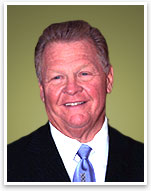 Tom Hoog, Senior Counselor to the Chairman of Hill and Knowlton got day one of Counselors Academy off to a good start with a refreshingly candid discussion of the key drivers of reputation management.
Tom Hoog, Senior Counselor to the Chairman of Hill and Knowlton got day one of Counselors Academy off to a good start with a refreshingly candid discussion of the key drivers of reputation management.
Hoog framed his issue at the outset: “Lack of trust is a growing problem in all the pillars of society. If we don’t strengthen trust, it will hamper our ability to move the economy and society forward.”
He cited a recent survey of students at 34 U.S. universities that discovered that only 39% would trust government to tell the truth, 22% would trust corporations and a mere 18% would trust the media to tell the truth.
He observed that, over the past eighteen months, we’ve seen several top PR agencies get themselves in trouble. Questioned about whether he believed that Fleishman Hillard’s reputation will be tarnished over several years as a result of the overbilling scandal in Los Angeles, Hoog responded that he expected it would “because all their competitors will use this against them.” He noted that, “It took Hill and Knowlton a full ten years to overcome the Kuwait incident.”
He noted a particular problem for public relations agencies, “In many cases, you are judged by who you represent. If you are representing someone who may be perceived as less than honourable, it will affect your own reputation.”
He added, “In the downturn, we did several things that hurt our reputations. We took business we shouldn’t have. We put junior people on it who didn’t do as good a job as they should have. And this hurt our industry’s reputation.”
His solution? According to Hoog, senior corporate executives must play a role in restoring and sustaining trust. “Executives must live the culture 24/7. … To do this, you must lead and develop your culture from your own value set. Then it is easy to live the brand and culture day in and day out. … [If you do otherwise], people will see you trying to be something that you are not.”
He underlined the importance of a strong, postive corporate culture, noting that senior executives do not have “the ability to keep an eye on everything that is going on. … The lowest person on the totem pole can destroy a reputation just as easily as the top person.”
Hoog also highlighted the problem faced by principals of small and medium-sized consulting firms. “When I was running my own small firm, I became the chief sales person and the top account executive and I did very little to run the firm. This was a terrible mistake. People did not know what I stood for. … It is important that principals in small firms focus on running the firm.”
He contrasted this with the approach that he took when he headed up Hill and Knowlton. At that time, the company had been losing revenue. A turnaround was required.
He started from a couple essential premises.
First, “Client turnover is directly related to staff turnover. A client hates having new people brought into accounts. He who minimizes staff turnover wins.”
Second, “How do you minimize staff turnover? Reputation.” He illustrated this with recent data from the Centre for Creative Leadership that indicates that the top four things on peoples’ list of they they want to work at a company are: number 1, “my thoughts, my opinons are valued;” number 2 “The company I work for is well thought of;” number 3: Career opportunities; and only at number 4, salary. He noted that the first three factors were tightly clustered with a separation of about five points from one to three. Salary trailed another five points behind these.
The solution Hill and Knowlton put in place reflected this understanding:
- “Our mission statement: We would grow through loyalty-based management.”Loyalty to clients “meant we would give clients ‘best teams’ regardless of geography.”
H&K changed its bonus program for leaders of offices. “You had to demonstrate that you had given away 20% of the revenue from your office.”
- “Loyalty to employees meant we would provide them with a career path. We instituted a “two year up or out policy.”
- To support this, H&K introduced a new training program. Initially the training budget was 6% of total revenues. Once H&K stabilized, it dropped to 4%.
- “Each employee had to take 30 credit hours per year. If they didn’t take it, they would not be eligible for a raise or a promotion.”
- “We also put a serious mentoring program sytem into place.”
- “And a 360 degree review process. It was cumbersome, but it worked.”
All in all, an excellent session. Hoog’s principals and methods can be used by firms both large and small. And while small firms lack the total resources of a giant like Hill and Knowlton, astute managers can choose particular initiatives to introduce to work to improve their situation.
The essential underpinning to any of these measures is that they are firmly grounded in a culture that reflects the values of the leadership of the firm. With this in place, any subsequent measures will ring true with employees and clients alike.

 Chris is right in his assessment of the important role played in his recruitment by
Chris is right in his assessment of the important role played in his recruitment by 